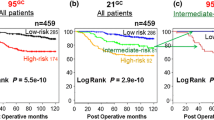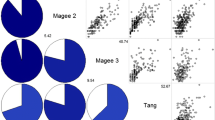Abstract
Background
Breast cancer is one of the most prevalent cancers in women. Oncotype Dx is a multi-gene assay frequently used to predict the recurrence risk for estrogen receptor-positive early breast cancer, with values < 18 considered low risk; ≥ 18 and ≤ 30, intermediate risk; and > 30, high risk. Patients at a high risk for recurrence are more likely to benefit from chemotherapy treatment.
Methods
In this study, clinicopathological parameters for 37 cases of early breast cancer with available Oncotype Dx results were used to estimate the recurrence score using the three new Magee equations. Correlation studies with Oncotype Dx results were performed. Applying the same cutoff points as Oncotype Dx, patients were categorized into low-, intermediate- and high-risk groups according to their estimated recurrence scores.
Results
Pearson correlation coefficient (R) values between estimated and actual recurrence score were 0.73, 0.66, and 0.70 for Magee equations 1, 2 and 3, respectively. The concordance values between actual and estimated recurrence scores were 57.6%, 52.9%, and 57.6% for Magee equations 1, 2 and 3, respectively. Using standard pathologic measures and immunohistochemistry scores in these three linear Magee equations, most low and high recurrence risk cases can be predicted with a strong positive correlation coefficient, high concordance and negligible two-step discordance.
Conclusions
Magee equations are user-friendly and can be used to predict the recurrence score in early breast cancer cases.



Similar content being viewed by others
References
International Agency for Research on Cancer. Latest world cancer statistics Global cancer burden rises to 14.1 million new cases in 2012: Marked increase in breast cancers must be addressed. World Health Organization. 2013 12 Dec.
Rakha EA, El-Sayed ME, Lee AH, Elston CW, Grainge MJ, Hodi Z, et al. Prognostic significance of Nottingham histologic grade in invasive breast carcinoma. J Clin Oncol. 2008;26(19):3153–8.
Turner BM, Skinner KA, Tang P, Jackson MC, Soukiazian N, Shayne M, et al. Use of modified Magee equations and histologic criteria to predict the Oncotype DX recurrence score. Mod Pathol. 2015;28(7):921–31.
Klein ME, Dabbs DJ, Shuai Y, Brufsky AM, Jankowitz R, Puhalla SL, et al. Prediction of the Oncotype DX recurrence score: use of pathology-generated equations derived by linear regression analysis. Mod Pathol. 2013;26(5):658.
McVeigh TP, Hughes LM, Miller N, Sheehan M, Keane M, Sweeney KJ, et al. The impact of Oncotype DX testing on breast cancer management and chemotherapy prescribing patterns in a tertiary referral centre. Eur J Cancer. 2014;50(16):2763–70.
Melisko M. A multigene assay to predict recurrence of tamoxifen-treated, node-negative breast cancer. N Engl J Med. 2005;5(1):45–7.
Paik S, Shak S, Tang G, Kim C, Baker J, Cronin M, et al. A multigene assay to predict recurrence of tamoxifen-treated, node-negative breast cancer. N Engl J Med. 2004;351(27):2817–26.
Cronin M, Sangli C, Liu ML, Pho M, Dutta D, Nguyen A, et al. Analytical validation of the Oncotype DX genomic diagnostic test for recurrence prognosis and therapeutic response prediction in node-negative, estrogen receptor–positive breast cancer. Clin Chem. 2007;53(6):1084–91.
Wolff AC, Hammond ME, Hicks DG, Dowsett M, McShane LM, Allison KH, et al. Recommendations for human epidermal growth factor receptor 2 testing in breast cancer: American Society of Clinical Oncology/College of American Pathologists clinical practice guideline update. J Clin Oncol. 2013;31(31):3997–4013.
Divaris K, Vann WF, Baker AD, Lee JY. Examining the accuracy of caregivers’ assessments of young children’s oral health status. J. Am. Dent. Assoc. 2012;143(11):1237–47.
Gwin K, Pinto M, Tavassoli FA. Complementary value of the Ki-67 proliferation index to the oncotype DX recurrence score. Int J Surg Pathol. 2009;17(4):303–10.
Cuzick J, Dowsett M, Pineda S, Wale C, Salter J, Quinn E, et al. Prognostic value of a combined estrogen receptor, progesterone receptor, Ki-67, and human epidermal growth factor receptor 2 immunohistochemical score and comparison with the Genomic Health recurrence score in early breast cancer. J Clin Oncol. 2011;29(32):4273–8.
Sahebjam S, Aloyz R, Pilavdzic D, Brisson ML, Ferrario C, Bouganim N, et al. Ki 67 is a major, but not the sole determinant of Oncotype Dx recurrence score. Br J Cancer. 2011;105(9):1342–5.
Allison KH, Kandalaft PL, Sitlani CM, Dintzis SM, Gown AM. Routine pathologic parameters can predict Oncotype DXTM recurrence scores in subsets of ER positive patients: who does not always need testing? Breast Cancer Res Treat. 2012;131(2):413–24.
Tang P, Wang J, Hicks DG, Wang X, Schiffhauer L, McMahon L, et al. A lower Allred score for progesterone receptor is strongly associated with a higher recurrence score of 21-gene assay in breast cancer. Cancer Invest. 2010;28(9):978–82.
Clark BZ, Dabbs DJ, Cooper KL, Bhargava R. Impact of progesterone receptor semiquantitative immunohistochemical result on Oncotype DX recurrence score: a quality assurance study of 1074 cases. Appl Immunohistochem Mol Morphol. 2013;21(4):287–91.
Tang G, Cuzick J, Costantino JP, Dowsett M, Forbes JF, Crager M, et al. Risk of recurrence and chemotherapy benefit for patients with node-negative, estrogen receptor–positive breast cancer: recurrence score alone and integrated with pathologic and clinical factors. J Clin Oncol. 2011;29(33):4365–72.
Biroschak JR, Schwartz GF, Palazzo JP, Toll AD, Brill KL, Jaslow RJ, et al. Impact of oncotype DX on treatment decisions in er-positive, node-negative breast cancer with histologic correlation. Breast J. 2013;19(3):269–75.
Flanagan MB, Dabbs DJ, Brufsky AM, Beriwal S, Bhargava R. Histopathologic variables predict Oncotype DX™ recurrence score. Mod Pathol. 2008;21(10):1255–61.
Van’t Veer LJ, Paik S, Hayes DF. Gene expression profiling of breast cancer: a new tumor marker. J Clin Oncol. 2005;23(8):1631–5.
Edén P, Ritz C, Rose C, Fernö M, Peterson C. “Good Old” clinical markers have similar power in breast cancer prognosis as microarray gene expression profilers. Eur J Cancer. 2004;40(12):1837–41.
Orucevic A, Bell JL, McNabb AP, Heidel RE. Oncotype DX breast cancer recurrence score can be predicted with a novel nomogram using clinicopathologic data. Breast Cancer Res Treat. 2017;163(1):51–61.
Cancer Registry, Ministry of Health, Jordan. Al-Sayaideh A, Nimri O, Arqoub K, Al-Zaghal M, Halasa W. Cancer incidence in Jordan-2012. https://www.moh.gov.jo/Echobusv3.0/SystemAssets/c602eda7-0c36-49cd-bea1-3484e46c0b97.pdf. Accessed 2 Dec 2017
Acknowledgements
This research was supported by King Hussein Cancer Center. We would like to thank our colleague from the statistics section Ms. Dalia Al-Rimawi who provided her expertise that greatly assisted the research. We would like to thank Springer Nature Author Services for professional English editing of this manuscript.
Author information
Authors and Affiliations
Corresponding author
Ethics declarations
Conflict of interest
The authors declare that they have no conflict of interest.
About this article
Cite this article
Sughayer, M., Alaaraj, R. & Alsughayer, A. Applying new Magee equations for predicting the Oncotype Dx recurrence score. Breast Cancer 25, 597–604 (2018). https://doi.org/10.1007/s12282-018-0860-x
Received:
Accepted:
Published:
Issue Date:
DOI: https://doi.org/10.1007/s12282-018-0860-x




